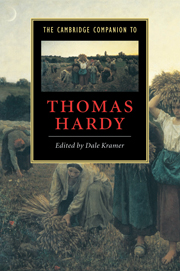Book contents
- Frontmatter
- 1 Thomas Hardy
- 2 Wessex
- 3 Art and aesthetics
- 4 The influence of religion, science, and philosophy on Hardy's writings
- 5 Hardy and critical theory
- 6 Thomas Hardy and matters of gender
- 7 Variants on genre
- 8 The patriarchy of class
- 9 The radical aesthetic of Tess of the d'Urbervilles
- 10 Hardy and readers
- 11 Hardy as a nineteenth-century poet
- 12 The modernity of Thomas Hardy's poetry
- Index
7 - Variants on genre
The Return of the Native, The Mayor of Casterbridge, The Hand of Ethelberta
Published online by Cambridge University Press: 28 May 2006
- Frontmatter
- 1 Thomas Hardy
- 2 Wessex
- 3 Art and aesthetics
- 4 The influence of religion, science, and philosophy on Hardy's writings
- 5 Hardy and critical theory
- 6 Thomas Hardy and matters of gender
- 7 Variants on genre
- 8 The patriarchy of class
- 9 The radical aesthetic of Tess of the d'Urbervilles
- 10 Hardy and readers
- 11 Hardy as a nineteenth-century poet
- 12 The modernity of Thomas Hardy's poetry
- Index
Summary
According to Peter Szondi, a crisis in European drama occurs around 1880. The reason for this crisis is essentially generic: drama is no longer absolute and primary (unfolding as a linear sequence in the present), but relies for its effect on narrative elements incorporated into the dramatic structure. Szondi's main example is Henrik Ibsen, in whose plays - such as Ghosts (1881) and The Wild Duck (1884) - the thematic significance of the actions, dreams, and desires of the main characters is inseparable from their past histories as unravelled through the playwright's sophisticated retrospective technique. “Here the past is not, as in Sophocles' Oedipus, a function of the present.”
Like most turning-points in literary form, the crisis Szondi identifies in European drama in the late nineteenth century is productive in that it precipitates the formal experimentation of twentieth-century drama. Szondi's notion of crisis also implicitly accentuates the link between various forms of generic interplay and the ways in which the characteristic features or sub-genres of one particular genre can be combined. In the genre of drama, Ibsen's dramaturgic use of the past is partly motivated by his understanding of tragedy.
- Type
- Chapter
- Information
- The Cambridge Companion to Thomas Hardy , pp. 112 - 129Publisher: Cambridge University PressPrint publication year: 1999
- 3
- Cited by



